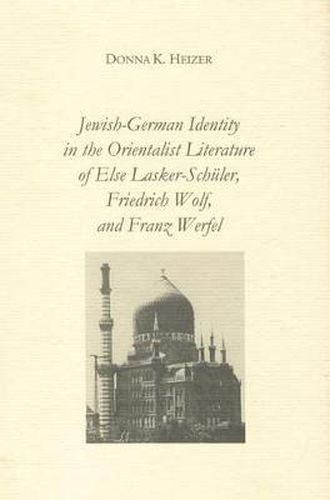Readings Newsletter
Become a Readings Member to make your shopping experience even easier.
Sign in or sign up for free!
You’re not far away from qualifying for FREE standard shipping within Australia
You’ve qualified for FREE standard shipping within Australia
The cart is loading…






This pioneering volume is the first to examine the phenomenon of Jewish-German orientalist literature. For many Jewish-German authors of the twentieth-century, the Orient represented an imaginative space where they could analyse their position as Jews in German society, and come to terms with a divided identity. Here, representations of Muslims and Islamicate cultures in the works of popular and respected authors who were nevertheless often seen as Jewish,Oriental ‘others’ by the German-speaking societies in which they lived are explored. Lasker-Schuler’s Die Nachte Tino von Bagdads (1907) and Der Prinz von Theben (1912) create a timeless Orient filled with visionaryartists like herself, while Wolf’s Mohammed: Ein Oratorium (1922) depicts the Orient as the birthplace of the message of justice espoused by Islam: through it Wolf reaches a new understanding of his position as a progressive Jew in a war-torn German society. In Werfel’s Die vierzig Tage des Musa Dagh (1933), the author uses the conflict between Turks and Armenians to explore his own religiosity.
$9.00 standard shipping within Australia
FREE standard shipping within Australia for orders over $100.00
Express & International shipping calculated at checkout
This pioneering volume is the first to examine the phenomenon of Jewish-German orientalist literature. For many Jewish-German authors of the twentieth-century, the Orient represented an imaginative space where they could analyse their position as Jews in German society, and come to terms with a divided identity. Here, representations of Muslims and Islamicate cultures in the works of popular and respected authors who were nevertheless often seen as Jewish,Oriental ‘others’ by the German-speaking societies in which they lived are explored. Lasker-Schuler’s Die Nachte Tino von Bagdads (1907) and Der Prinz von Theben (1912) create a timeless Orient filled with visionaryartists like herself, while Wolf’s Mohammed: Ein Oratorium (1922) depicts the Orient as the birthplace of the message of justice espoused by Islam: through it Wolf reaches a new understanding of his position as a progressive Jew in a war-torn German society. In Werfel’s Die vierzig Tage des Musa Dagh (1933), the author uses the conflict between Turks and Armenians to explore his own religiosity.